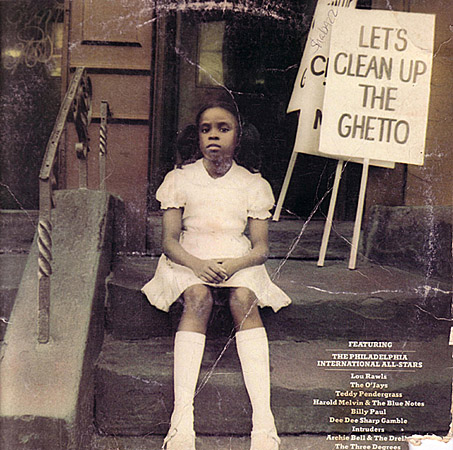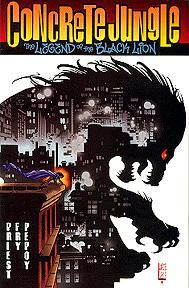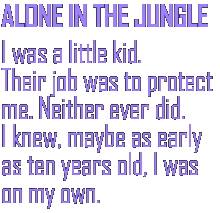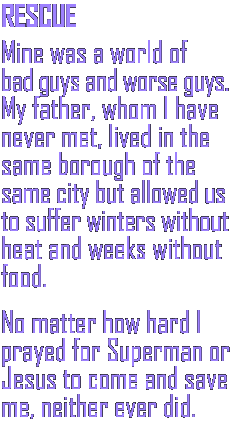
Once Upon A Time In The Jungle...
She was seventeen years old and she fought with her mom a lot and so it came to pass that Tammy ran off and moved in with her drug dealer boyfriend. And this is where the police found her after the drug dealer's rivals broke into the house and started shooting. They didn't even know who Tammy was, nor did they care. She died to make a point; to punctuate a sentence. And, much as I'd like to tell you this is a scene from Concrete Jungle, the comic book this essay was originally published in, the truth is Tammy, her real name, was a friend of mine. A nice girl from a nice neighborhood who lived in a house on a nice, suburban street and who had a mom and a dad and a cat and a station wagon. She wasn't Shareeka the Jheri Curl Reefer Queen, cracked out and staggering down Fulton Street mangling Busta Rhymes tunes. She was third from the left in the photo I took when our team won the flag at summer camp in 1974. She was Nancy's best friend and, though Nancy was Lucy Van Pelt to my Charlie Brown, Tammy was always kind to me, always my bud. Rustling around somewhere in Priest's Big Bag Of Regrets is the fact I never tried to be more than a friend to Tammy, as though decisions we make could actually stay the hand of an often perplexing God.
If you've never had a .45 automatic aimed at you in anger,
you're really missing something. It looks like the biggest,
blackest, meanest piece of metal ever created by man, and you
suddenly move somewhere to the right of yourself and become a
casual observer; a lowly extra in the film of your own life's
story. You want Tom Cruise, but you get Jon Lovitz. You become
Jon Lovitz as frame after boring frame of your life clicks by
while the guy holding the gun plays keep-away with your dignity.
I grew up in daily mortal fear and with an acute awareness of
where I could and could not go, the difference between the two
being as little as a city block. I’d wake up to the thunder of
jungle drums: idiots who’d literally point giant speakers out of
their windows and start blasting what would later become known
as Hip-Hop music from their homes in a kind of jungle warfare.
It was tribal: the precious little dignity these young boys had
centered around their material wealth or the illusion thereof
created by who had the loudest sound system. These boys filled
their days hanging out on stoops, hustling for beer and reefer
money, playing basketball, and telling lies about sex. You could
tell the guys who were actually having sex from the liars
because the guys actually having sex usually left the jungle
because they got some stupid girl knocked up, just as my sister,
a stupid jungle girl, got herself knocked up. Like we didn’t
already have enough problems. There wasn’t a huge distinction
between life in the jungle and life in the yard at Rikers
Island. All we had was time and far too much of it.
I was terrorized, daily, first and foremost by my own sister,
who escalated sibling rivalry into Josef Mengele-level masochism
and who routinely encouraged and joined in with the neighborhood
bullies who beat and terrorized me just as she beat and
terrorized me. For three consecutive years I never once came in
alone through the front door of my own house, but went out the
back and jumped over neighbors' fences to avoid bad guys and
worse guys. I was afraid to be on the streets, I wasn’t safe at
home because my sister would routinely invite the streets
inside. I mean, I’d come home and find the jungle in my house,
waiting for me, my idiot sister serving these terrorists who
beat me, who robbed our house, snacks and
entertaining them. I spent the majority of my childhood wishing
to be away from these people I lived with. That was my only goal
in life: Get Away From Here. Get Away From Them. I was a little
kid. Their job was to protect me. Neither ever did. I knew,
maybe as early as ten years old, I was completely on my own.

Osama bin Debra:: Philadelphia International All-Stars' Let's Clean Up The Ghetto.
In the jungle you look no one directly in the eye.
You practice invisibility, and the best days are the ones that
pass without incident. There is a casual acceptance among even
the youngest jungle kids that death could come literally at any
moment, and this acceptance becomes license to define their own
morality based on consequence and circumstance.
Mine was a world of bad guys and worse guys, and no matter how
hard I prayed for Superman or Jesus to come and save me, neither
ever did. My father, whom I have never met, lived in the same
borough of the same city but allowed us to suffer winters
without heat and weeks without food. Mom used to make what I
called her famous “Five Day Soup,” a concoction of whatever was
lying around that actually wasn’t bad the first two or three
days you ate it. I kept looking for the man with the white hat
or the man on the white horse to ride to the rescue, but the
reality was my mother, sister and I standing in waist-high snow
waiting for a bus that wasn't coming.
I could easily have become Elijah Book or Terry Smalls or
Freedom "Mayor Bob" Mandela—main characters from The Concrete
Jungle, a series torpedoed by Acclaim Comics’ abrupt demise in
1998. In some ways, I am all of them. As a writer all I do is
report what I've seen and what I know to be true in some
pathetic attempt at self-healing. Jungle, a cynical, dark urban
legend, was born out of a childhood of constant anxiety, a
childhood lacking either safety or security, its joy and rage
and tears and unanswered questions and all that lack of closure
trotted out in metaphors of masked goats and so forth.
Concrete Jungle is an urban fable about bad guys and
worse guys— people moving through the jungle in herds of
collective self-interest. Political activist/huckster Terry
Smalls is visited by an African mystic who informs him he is
heir to a noble legacy. Smalls' conversion puts him at odds with
a massive wheel of corruption, the self-defining morality of the
urban jungle, of which Tammy Rogers’ unsolved murder is the
center hub. Like building a Taco Bell in the Veldt, obtaining
justice for Tammy will be a shock to the jungle's eco system.
Smalls has to struggle with both his own moral weakness and the
question of whether the re-setting of one man's moral compass is
worth the destruction of almost every life he touches— starting
with his own.
As with my actual life, Concrete Jungle is full of evil people
who do wonderfully noble things and good people who benignly
incorporate some level of hypocrisy and corruption. With people
who love without sacrifice. It is ruthlessly, giddily cynical
with a dash of hope tossed in, hope being the most invented part
of the piece. It’s got crime and sex and politics and ancient
mysticism and modern religion, with heaping doses of black humor
and wrenching terror.
And, threaded through the complex layers, it's got what I know
to be true. Just a little piece of it. Maybe that's enough.
Part of the many complex reasons my marriage failed was my wife
failing to convince me to move back there. We lived in New
Jersey at the time but her family still lived in New York.
Moving closer to "home" was the farthest thing from my mind. I
have terrible memories of growing up, of the old neighborhood
and the old faces. Once my mother and grandmother moved to
Florida, I no longer had any reason whatsoever to go there, and
it's been at least fifteen years since I have. This was
something I could never get her to understand: I wasn't being
selfish, this was about survival. If I moved back there, I'd
lose my mind.
I no longer live in the jungle. I live in the
foothills of the Rocky Mountains, in a town where crime is
pretty low, perhaps because the corner drug store sells pistols
and everybody's got a gun rack on their Toyota 1-Ton. Maybe I
just traded one jungle in for another.
Christopher J. Priest
Relatively Jungle-Free
22 February 1998 (Original)
21 November 2011
Home | Blog | Projects | Comics | Rants | Music | Video | Christian Site | Contact
Unless Otherwise Specified, Text Copyright © 2011 Lamercie Park. All Rights Reserved.
TOP OF PAGE




